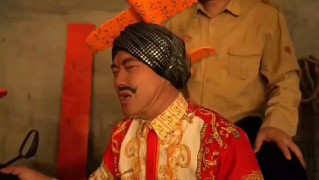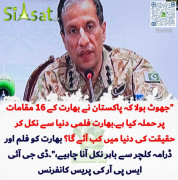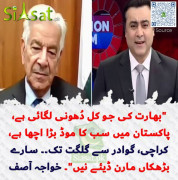S
Siasati
Guest
Local Government System Abolished (Breaking News )
In the national interest
Monday, July 13, 2009
Kamal Siddiqi
The writer is editor reporting, The News
It is an irony in Pakistan that democratic governments are the biggest enemies of the local bodies system, despite the fact that local governments are the foundation of any democratic setup. In the past, local-bodies elections were held when unelected dictators were in power. It was unusual for a democratic government to hold these polls.
This government is no exception.
Now what we are seeing is that yet another elected government is sabotaging a democratic system that works. This week, our well-meaning but otherwise out of touch prime minister took the step of dissolving the local governments. What is worrisome is not the fact that these were dissolved but that elections would not be held until one year has passed. And in that too there is no certainty.
Till now we were expecting that since these bodies had completed their terms, they would be dissolved so that elections could be held. Administrators would be appointed for the interim, given that in our political history it is rare for an incumbent government to hold free and fair elections. What we were not expecting was that the administrators would be given such a long period of control on the pretext of law and order.
Needless to say, there is outrage. While pro-PPP persons are claiming that the system is faulted and needs to be corrected, for most Pakistanis the Nazim system, a brainchild of General Musharraf, has worked well. The credit goes to General Naqvi, the person who put this system in place, for giving Pakistanis the sense of local government that worked.
In fact, many Pakistanis have more faith in the local governments than the provincial and federal governments. By and large, people in Pakistans main cities were happy with the way the Nazims functioned.
Karachis Nazim Mustafa Kamal had outshone most other political figures in the country with his can-do attitude and his ability to deliver services and structures to the people of Karachi in such short a timeframe. Needless to say, the might and organisation of the MQM was behind Mustafa Kamal, but the fact remains that he delivered where almost all others had failed. There were many other success stories across towns and villages throughout Pakistan.
In the case of Pakistans largest city, there are many who appreciated the way Karachi was being transformed. But there were others possibly who resented this. It is these forces that have now ganged up to deprive the people once again of meaningful government.
The success of the local bodies system possibly was in the fact that councillors were more easily accessible and ready to take on challenges than MPAs and MNAs and DCs and other bureaucrats. The original system of General Naqvi was somewhat modified by the bureaucracy which finally had its say in reducing the financial powers of the Nazims.
What amazes many is how the system worked in the first place, given opposition from the bureaucracy and certain political forces. Nowhere in the world do you have a city mayor who does not have control of the police. But in Pakistan this was the arrangement. And yet the system worked.
Make no mistake the biggest losers in the local bodies system were the babus, the super bureaucrats who saw their powers being curtailed as elected representatives took over. The bureaucrats initially played along and dismissed the Nazims and the other elected representatives as temporary phenomena.
The office of the DC had lost its glory. People would no longer line up for favours and blessings. The power structure had started to shift, and that is why the empire had to strike back. Owing to the popularity of the system and the fact that the Nazims, despite having had their powers curtailed, were able to connect with the people and deliver basic services, meant that the system flourished. Now, two terms and almost a decade later, the PPP has decided to sabotage a genuine democratic system.
Those who are critical of the government say that the PPP has taken the step because it does not enjoy support in any of the countrys major cities, where the local government system was most visible. To its credit, despite earlier attempts to shut the local-government system down, the PPP government did, in fact, allow the local bodies to complete their tenures.
But what next?
Some say the PPP party faithful want a slice of the cake. And that is why they forced the leadership to make the kill. The fact that an unelected bureaucrat or political appointee would now be in charge had meant that contracts would not pass through the process that was earlier adopted.
Short-term gains at the cost of long-term benefits for the country. That seems to be the pattern one sees in the Gilani government. The party faithful need to make money and that is why such steps are being taken. But by doing away with a system that worked, Prime Minister Gilani is sowing the seeds for the fall of his own government.
This step has already been challenged in the courts. As things stand, the whole idea of having unelected administrators for one year to lord it over the people does not have the legal backing that is required. It is a gamble that the prime minister has taken on grounds of law and order. The argument does have some merit given the fragile law-and-order situation in the country, holding elections would have meant inviting acts of terror, as well as violence. But, then, general elections were held in circumstances that were not much different.
It is not the idea but the intention of the government that causes worry. And if this will turn into yet another messy legal battle, the chances are again that the PPP and its coalition allies will be looking for other options. The prospect of this is not pleasing.
If anything, the government should have focused its attention on the large tracts of land in cities that are under the control of the cantonment boards. In most of these areas, which were originally set aside for our military personnel, with time and development, they are no more cantonments in the true sense of the word.
Cantonments were supposed to be out of the city. But now, most of them are located in city centres. In most cantonment areas across towns and cities across Pakistan, the large chunk of residents are civilians. While they have no rights, the civilians dutifully pay the taxes and levies imposed on them because most cantonments are considered to better-located and -managed localities, which sometimes is not the case.
In the final analysis. we need to strengthen the local bodies system by giving elected representatives more powers and also bring more areas populated by civilians under the system. We cannot have independent islands within cities as large as Karachi and Lahore. The system needs to be improved, not sabotaged.
In this, the government and the party which claims that democracy is the only way forward should work to strengthen the system, not make a few people richer. It is somewhat an irony that the PPP usually ends up relying too much on the bureaucracy which in turn plays a pivotal role in having the party removed from power. It has happened time and again. When will we learn our lessons and work for Pakistan?
http://thenews.com.pk/daily_detail.asp?id=187776
In the national interest
Monday, July 13, 2009
Kamal Siddiqi
The writer is editor reporting, The News
It is an irony in Pakistan that democratic governments are the biggest enemies of the local bodies system, despite the fact that local governments are the foundation of any democratic setup. In the past, local-bodies elections were held when unelected dictators were in power. It was unusual for a democratic government to hold these polls.
This government is no exception.
Now what we are seeing is that yet another elected government is sabotaging a democratic system that works. This week, our well-meaning but otherwise out of touch prime minister took the step of dissolving the local governments. What is worrisome is not the fact that these were dissolved but that elections would not be held until one year has passed. And in that too there is no certainty.
Till now we were expecting that since these bodies had completed their terms, they would be dissolved so that elections could be held. Administrators would be appointed for the interim, given that in our political history it is rare for an incumbent government to hold free and fair elections. What we were not expecting was that the administrators would be given such a long period of control on the pretext of law and order.
Needless to say, there is outrage. While pro-PPP persons are claiming that the system is faulted and needs to be corrected, for most Pakistanis the Nazim system, a brainchild of General Musharraf, has worked well. The credit goes to General Naqvi, the person who put this system in place, for giving Pakistanis the sense of local government that worked.
In fact, many Pakistanis have more faith in the local governments than the provincial and federal governments. By and large, people in Pakistans main cities were happy with the way the Nazims functioned.
Karachis Nazim Mustafa Kamal had outshone most other political figures in the country with his can-do attitude and his ability to deliver services and structures to the people of Karachi in such short a timeframe. Needless to say, the might and organisation of the MQM was behind Mustafa Kamal, but the fact remains that he delivered where almost all others had failed. There were many other success stories across towns and villages throughout Pakistan.
In the case of Pakistans largest city, there are many who appreciated the way Karachi was being transformed. But there were others possibly who resented this. It is these forces that have now ganged up to deprive the people once again of meaningful government.
The success of the local bodies system possibly was in the fact that councillors were more easily accessible and ready to take on challenges than MPAs and MNAs and DCs and other bureaucrats. The original system of General Naqvi was somewhat modified by the bureaucracy which finally had its say in reducing the financial powers of the Nazims.
What amazes many is how the system worked in the first place, given opposition from the bureaucracy and certain political forces. Nowhere in the world do you have a city mayor who does not have control of the police. But in Pakistan this was the arrangement. And yet the system worked.
Make no mistake the biggest losers in the local bodies system were the babus, the super bureaucrats who saw their powers being curtailed as elected representatives took over. The bureaucrats initially played along and dismissed the Nazims and the other elected representatives as temporary phenomena.
The office of the DC had lost its glory. People would no longer line up for favours and blessings. The power structure had started to shift, and that is why the empire had to strike back. Owing to the popularity of the system and the fact that the Nazims, despite having had their powers curtailed, were able to connect with the people and deliver basic services, meant that the system flourished. Now, two terms and almost a decade later, the PPP has decided to sabotage a genuine democratic system.
Those who are critical of the government say that the PPP has taken the step because it does not enjoy support in any of the countrys major cities, where the local government system was most visible. To its credit, despite earlier attempts to shut the local-government system down, the PPP government did, in fact, allow the local bodies to complete their tenures.
But what next?
Some say the PPP party faithful want a slice of the cake. And that is why they forced the leadership to make the kill. The fact that an unelected bureaucrat or political appointee would now be in charge had meant that contracts would not pass through the process that was earlier adopted.
Short-term gains at the cost of long-term benefits for the country. That seems to be the pattern one sees in the Gilani government. The party faithful need to make money and that is why such steps are being taken. But by doing away with a system that worked, Prime Minister Gilani is sowing the seeds for the fall of his own government.
This step has already been challenged in the courts. As things stand, the whole idea of having unelected administrators for one year to lord it over the people does not have the legal backing that is required. It is a gamble that the prime minister has taken on grounds of law and order. The argument does have some merit given the fragile law-and-order situation in the country, holding elections would have meant inviting acts of terror, as well as violence. But, then, general elections were held in circumstances that were not much different.
It is not the idea but the intention of the government that causes worry. And if this will turn into yet another messy legal battle, the chances are again that the PPP and its coalition allies will be looking for other options. The prospect of this is not pleasing.
If anything, the government should have focused its attention on the large tracts of land in cities that are under the control of the cantonment boards. In most of these areas, which were originally set aside for our military personnel, with time and development, they are no more cantonments in the true sense of the word.
Cantonments were supposed to be out of the city. But now, most of them are located in city centres. In most cantonment areas across towns and cities across Pakistan, the large chunk of residents are civilians. While they have no rights, the civilians dutifully pay the taxes and levies imposed on them because most cantonments are considered to better-located and -managed localities, which sometimes is not the case.
In the final analysis. we need to strengthen the local bodies system by giving elected representatives more powers and also bring more areas populated by civilians under the system. We cannot have independent islands within cities as large as Karachi and Lahore. The system needs to be improved, not sabotaged.
In this, the government and the party which claims that democracy is the only way forward should work to strengthen the system, not make a few people richer. It is somewhat an irony that the PPP usually ends up relying too much on the bureaucracy which in turn plays a pivotal role in having the party removed from power. It has happened time and again. When will we learn our lessons and work for Pakistan?
http://thenews.com.pk/daily_detail.asp?id=187776






























